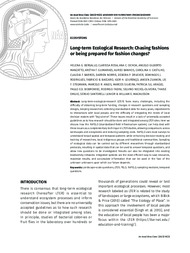Long-term ecological research: chasing fashions or being prepared for fashion changes?
Long-term ecological research: chasing fashions or being prepared for fashion changes?
Author(s): BERGALLO, H. G.; ROSA, C.; OCHOA, A. C.; MANZATTO, A. G.; GUIMARAES, A. F.; BANHOS, A.; CASTILHO, C. V. de; BARROS, C. F.; NORRIS, D.; DRUCKER, D. P.; RODRIGUES, D. J.; BACCARO, F. B.; LOURENÇO, I. H.; ZUANON, J.; STEGMANN, L. F.; ANJOS, M. R.; SILVEIRA, M.; ARAÚJO, P. S.; BOBROWIEC, P. E.; FADINI, R.; NECKEL-OLIVEIRA, S.; EMILIO, T.; SANTORELLI JUNIOR, S.; MAGNUSSON, W. E.
Summary: Abstract: Long-term-ecological-research (LTER) faces many challenges, including the difficulty of obtaining long-term funding, changes in research questions and sampling designs, keeping researchers collecting standardized data for many years, impediments to interactions with local people, and the difficulty of integrating the needs of local decision makers with "big science". These issues result in a lack of universally accepted guidelines as to how research should be done and integrated among LTER sites. Here we discuss how the RAPELD (standardized field infrastructure system), can help deal with these issues as a complementary technique in LTER studies, allowing comparisons across landscapes and ecosystems and reducing sampling costs. RAPELD uses local surveys to understand broad spatial and temporal patterns while enhancing decision-making and training of researchers, local indigenous groups and traditional communities. Sampling of ecological data can be carried out by different researchers through standardized protocols, resulting in spatial data that can be used to answer temporal questions, and allow new questions to be investigated. Results can also be integrated into existing biodiversity networks. Integrated systems are the most efficient way to save resources, maximize results, and accumulate information that can be used in the face of the unknown unknowns upon which our future depends.
Publication year: 2023
Types of publication: Journal article
Unit: Embrapa Roraima
Observation
Some of Embrapa's publications are published as ePub files. To read them, use or download one of the following free software options to your computer or mobile device. Android: Google Play Books; IOS: iBooks; Windows and Linux: Calibre.
Access other publications
Access the Agricultural Research Database (BDPA) to consult Embrapa's full library collection and records.
Visit Embrapa Bookstore to purchase books and other publications sold by Embrapa.

